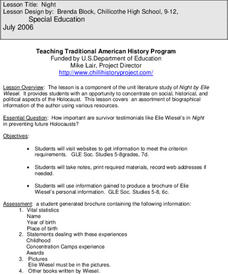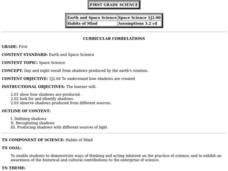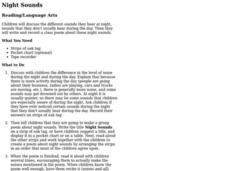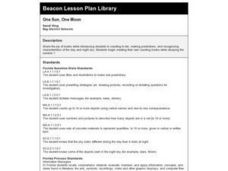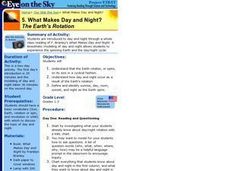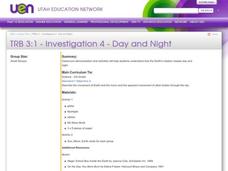Curated OER
Measure
Students are asked what activities or things that they do each day. They are then asked do you do that in the morning, afternoon, or night? Students are then asked which of those things do you do first, second, third, and etc.
Curated OER
Night
Students read Night by Elie Wiesel, examine importance of survivor testimonials like Wiesel's in preventing future Holocausts, research biographical information online about Wiesel, and create author brochure including vital statistics,...
Curated OER
The Final Solution
Students distinguish between concentration, labor and death camps, describe conditions in concentration camps, read and discuss Night, by Elie Wiesel, and describe methods Nazis used to disguise true purpose of death camps and...
Curated OER
Magic Squares for Shakespeare's Twelfth Night, Act II, scene 5
Readers of Shakespeare’s Twelfth Night use a magic squares matrix to match vocabulary words from Act II, Scene 5 with their definitions. An answer key is provided.
Curated OER
Background Knowledge and Making Connections
Students investigate what they know about the Holocaust. In this historical perspectives lesson, students complete KWL charts about Hitler and the Holocaust and create found poems on the topic prior to reading Wiesel's "Night."
Curated OER
Comparing and Contrasting Fiction and Nonfiction Using Graphic Organizers
Students compare and contrast fiction and non-fiction selections. In this writing skills lesson, students use different forms of graphic organizers to compare "The Three Little Pigs," to Wiesel's Night.
Curated OER
Interative History Notebook Mini-lesson
Students respond to Holocaust literature. In this interactive history lesson, students select quotes from chapter 1 of Elie Wiesel's Night and reflect on their meaning as they record their thoughts on poetic, prose, comic. or picture form.
Curated OER
When (Seasons, Day, or Night)
Practice identifying the setting with a reading activity. Kindergartners find the setting of a story by observing when the story takes place. They read the book Look! Snow! by Kathryn O. Galbraith and decide in which season the story...
Curated OER
Globe Lesson 13 - When the Day Changes
Students explore the patterns of day and night. In this geography skills lesson, students read brief selections and examine diagrams that note the transition of day and night around the world. Students respond to the questions included...
Curated OER
There Are So Many Stars
Students explore the night sky. In this astronomy lesson, students discover a song about the stars in the sky and participate in a flannel board activity pertaining to the song.
Curated OER
Sunrise, Sunset: Quickly Go the Days
Students explore the concept of daylight. In this daylight lesson, students compare the amount of daylight on a particular day in Anchorage compared with daylight where they live. Students color maps of the US according to amount of...
Curated OER
Globe Lesson 11 - Rotation of the Earth - Grade 6+
In this rotation of the Earth worksheet, students read a 2-page review of the rotation of the earth and respond to 10 short answer questions.
Curated OER
The Sun
In this earth science learning exercise, 3rd graders go outside on a day that has both sun and clouds. They explain, without looking at the sun, how they can tell when the sun is hidden by clouds. They look at pictures that show the sun...
Curated OER
Day and Night
In this day night compare and contrast worksheet, students examine a picture of the earth and of the sun labeling day, night, equator, sun, North Pole, and South Pole.
Curated OER
What Can You See in the Sky?
In this objects in the sky activity, students will compare what they can see in the sky during the day and during the night. Students will complete 8 fill in the blank statements.
Curated OER
Day and Night
Fifth graders investigate the Earth's rotation and revolution and the moon's orbit around the Earth. They participate in a class discussion about how night and day occur, and take notes. Next, they watch a video about the solar system...
Curated OER
Day and Night
First graders study that day and night result from shadows produced by Earth's rotation. Students work to show how shadows are produced, look for and identify shadows and observe shadows produced from different sources.
Curated OER
Day And Night
First graders examine how the earth experiences day and night by using a flashlight and a globe as a model.
Curated OER
Let's Think About Day and Night
Students explore day and night and the relationships between the Earth, the sun and the moon. They discuss the ways in which the sun and moon help us. They watch a short video that helps illustrate these concepts.
Curated OER
Night Sounds
Students listen and discuss the sounds they heard at night. They write a class poem about those sounds at night. They keep a chart on their desk for ideas. The poem is read aloud to the class when it is finished.
Curated OER
Starry, Starry Night
Students, using construction paper, and an empty black film canster with no lid, create their own night sky full of stars that can be seen in the middle of the day.
Curated OER
One Sun, One Moon
First graders read "Ten Black Dots" by Donald Crews and then create their own counting books focusing on the number 1 (one) and using yellow dots to represent the sun, moon and stars.
Curated OER
What Makes Day and Night? The Earth's Rotation
Students discover that the Earth rotates on its axis in a cyclical fashion. They examine how this rotation results in day and night.
Curated OER
Day and Night
Third graders view a classroom simulation that demonstrates how the Earth's rotation creates day and night.



